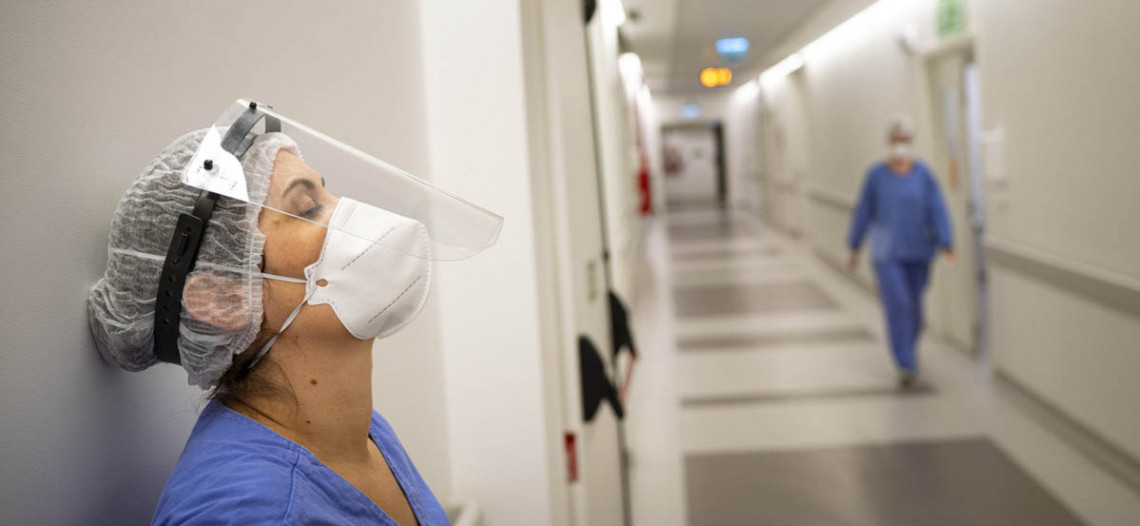
Brazil: Violence impacts the mental health of professionals working in essential services

Brasília (ICRC) – Even with the Covid-19 pandemic making its mark, armed violence in Brazil continued unabated in 2020. According to data from the Brazilian Public Safety Yearbook, 50,033 intentional violent deaths were documented in the country, representing an increase of 4% compared to the previous year. Concerned over the impact that violence and the pandemic have had on the mental health of staff working in essential services, the International Committee of the Red Cross (ICRC) assembled health experts and managers on Thursday (7) to discuss their experiences in building and implementing responses to this phenomenon.
"It's very important that experiences are shared between various managers of essential services and experts in the field of mental health, because this makes it possible to learn about the latest strategies from each other and to keep abreast of new positive and negative experiences coming out of each action and strategy. These exchanges also promoted reflections on concrete measures to create or bolster responses to the mental health needs of professionals in essential services who are impacted by armed violence and the pandemic," explains the coordinator for the Psychosocial Mental Health Support program of the ICRC Delegation for Brazil and Southern Cone countries.
The webinar featured concrete experiences from bureaus in Duque de Caxias (RJ), Fortaleza (CE) and Porto Alegre (RS), and included psychosocial support strategies for professionals working in services such as health, education and social assistance. In partnership with the Porto Alegre Municipal Health Secretariat, PUC-RS presented the results of a psychological first aid workshop comprised of preparation, reception, listening, prioritization, action and reassessment. At the end, the participants showed that they were extremely confident in providing this type of support.
Health and education managers from the municipality of Duque de Caxias described how they structured care, active listening and stress management activities. "At the Family Health Support Centers (NASF, in Portuguese), staff psychologists and psychiatrists are assisting professionals who had suffered from episodes – not only involving armed violence, but also due to the pandemic itself," related Odimar Magdalena Lisboa from the city's Municipal Health Secretariat.
In addition to the other four, the municipalities participating in the activity are ICRC partners in the Safer Access to Essential Public Services (AMS) program, an initiative intended to prevent and mitigate the humanitarian impacts of armed violence on these services.
According to an assessment by Erisneuda Araújo, an expert from the Célula de Mediação Social e Cultura de Paz (of the Municipal Education Department of Fortaleza), the recommendations and protocols proposed by the AMS and applied at each facility make a difference when a situation arises involving violence. "Challenges exist and it's only human to be afraid. What do you do when an armed actor within your unit is holding you at gunpoint? We never know how to react. And the AMS comes along with this idea that things can be done differently through a few simple attitudes that can effect a change," she shared.
Partnerships and shared responses were common themes during the presentations. In her opening remarks, the ICRC Delegation Chief of Operations, Laurent Wildhaber, explained the importance of concerted efforts and responses. "Together, we can go further and reach more people. We can provide experiences, recommendations and technical advice, but this response will reach more people in a more relevant and suitable way if it's put into practice with local actors," she stated.
Participants in the webinar included Liliane Maria dos Santos (Municipal Health Secretariat of Porto Alegre (RS)), Gustavo Ramos (PUC-RS Trauma and Stress Research Center), Maria Erisneuda Araújo (Fortaleza City Hall and State Health Secretariat of Ceará), Plínio Silveira (Municipal Education Secretariat of Duque de Caxias (RJ)) and Odimar Magdalena Lisboa (Municipal Health Secretariat of Duque de Caxias (RJ)). Representing the ICRC were the Operations Chief, Laurent Wildhaber; the coordinator of Mental Health and Psychosocial Support (SMAPS, in Portuguese), Renata Reali; the SMAPS advisor for the ICRC office in Fortaleza, Elvis Posada; and the head and senior manager of the Safer Access to Essential Public Services program, Karen Cerqueira and Lívia Schunk.

The webinar featured concrete experiences from bureaus in Duque de Caxias (RJ), Fortaleza (CE) and Porto Alegre (RS), and included psychosocial support strategies for professionals working in services such as health, education and social assistance.
Research suggests that violence has an impact on the mental health of public employees in Fortaleza (CE)
Five partners from the municipality of Fortaleza (CE), working in collaboration with the ICRC, conducted a survey of professionals working in essential services in the city. According to the Impact of Armed Violence on the Mental Health of Professionals in Essential Public Services study, 29.16% of professionals acknowledge that they suffer from anxiety, stress and depression.
Even at times when armed violence is not as intense as usual, professionals stand at a medium level on a scale measuring mental exhaustion, secondary trauma and compassion fatigue. One in five professionals realize that they need help, but have not actually looked for any.
The study was conducted with professionals from the municipal Education, Health, Human Rights and Social Development secretariats, Special Coordination of Public Policies for Youth and the Hospital Geral Waldemar de Alcantara Home Care Service of Fortaleza. The random sample size of respondents was 1,662 people. The margin of error for the research is 5%, and the reliability rate is 95%.
The study offers recommendations on looking after caregivers – taking care of psychologists in essential services, developing mental health protocols and establishing or expanding partnerships with institutions.
Erisneuda Araújo added, "Based on this research, we were able to conceive and structure our services in a way that allowed us to respond to these situations involving violence that have an impact on the mental health of these professionals. Initiatives include a stress management group, protocols and flows of psychosocial care, psychological duty, and others."
